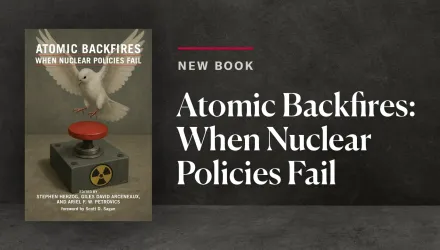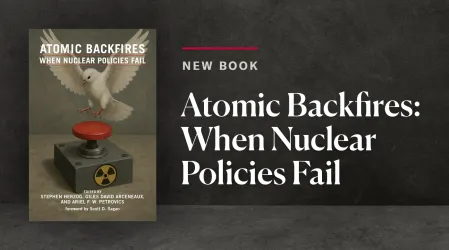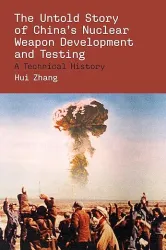1. Some have argued that the nuclear capability and testing of India and Pakistan help keep peace in South Asia as with the U.S. and Soviet Union during the Cold War. In your opinion is the threat of mutual destruction in effect limiting peace in South Asia?
First of all, I think there are key differences between the Cold War dyad—the U.S. and the Soviet Union—and India and Pakistan that have actually increased instability in South Asia. The first is that the U.S. and Soviet Union, for the most part, had an interest in maintaining the status quo, whereas in India and Pakistan, Pakistan has had longstanding revisionist preferences with respect to Kashmir. In particular, it supported separatist movements in Punjab in the late '80s and early '90s. So the problem is you get a higher frequency of crises between the two states that are of core national security interest, in particular to India.
There are several other key differences that make the India-and-Pakistan nuclear balance less stable. The first being the proximity of the two; they border each other whereas the U.S. and Soviet Union were separated by tens of thousands of miles which meant that warning times were longer, giving leaders time to confirm or disconfirm potential warnings. In India and Pakistan, the proximity of the two nations means that decision making is compressed and leaders would have to act a lot quicker than they would have in the U.S. and Soviet Union. When crises do develop, the fear of a pre-emptive strike from one or the other side increases the instability in those crises. The second key difference is that neither India nor Pakistan have advanced early warning capabilities or the kinds of support architectures for their nuclear weapons capabilities that the U.S. and Soviet Union did. Those twin features, proximity and the lack of robust early warning and safety capabilities, mean that misperceptions and the fog of war are even thicker in the India and Pakistan case.
The situation we've seen in the past ten years has actually been quite pessimistic, quite disturbing actually, because you've had a series of crises precipitated by Pakistan's limited revision intentions in Kargil. There were terrorists attacks against India's parliament in 2001, which precipitated a year-long crisis afterwards where India mobilized a massive conventional force against Pakistan but was inhibited from retaliating because of Pakistan's nuclear deterrent, and then again in the Mumbai attacks in 2008 you saw a very similar situation.
There are some scholars who argue that mutual nuclearization is actually more stabilizing but, unfortunately, my view is that Pakistan's acquisition of a first-use nuclear capability increased their ability to achieve these revisionist preferences at the conventional and sub-conventional level, emboldened to more aggressively threaten India's territorial integrity. And while India has been inhibited from retaliating, thus far, they are trying to make revisions with their conventional posture to allow them to enable surprise conventional retaliatory options. They call it Cold Start, which is basically trying to enable India to execute surprise offensives across the Pakistani border to retaliate against these kinds of terrorists attacks. But that might force Pakistan to go to an even more ready nuclear posture where they may have nuclear weapons deployed in the field with very few safety and negative controls. You might get a situation then where a crisis precipitated by a terrorist attack supported by the Pakistani state escalates after India responds with a surprise conventional retaliation, ratcheting up instability and the risk of theft and authorized or unauthorized use of nuclear weapons.
Ultimately, I think there are very big differences between the India-Pakistan case and the U.S. and Soviet Union. We shouldn't be too quick to draw lessons from the stability of the U.S. and Soviet Union case especially since it wasn't all that stable itself. Instability between India and Pakistan would just be magnified because of the proximity and the lack of capabilities, coupled with Pakistan's persistent limited revisionist preferences toward India. So I'm a lot more pessimistic in the India-Pakistan dyad than I would have been with the U.S.-Soviet Union.
2. Should Iran or North Korea succeed in their nuclear endeavors, what would be the benefits of the defense umbrella the U.S. Secretary of State Hilary Clinton suggested?
Secretary of State Clinton recently suggested a defense umbrella for the Middle East, if I remember correctly, in the event that Iran should acquire nuclear weapons. She was very careful not to specify what kind of defense umbrella it would be. She didn't necessarily imply a nuclear umbrella.
In northeast Asia, we've long had a de facto nuclear umbrella over Japan and South Korea which was made credible by the fact that we had forces deployed in both those cases against a potential North Korean threat. There doesn't seem to be any revisions to that policy. But in the Middle East, the extension of the defense umbrella is a little more problematic because American-extended deterrence promises are very hard to make credible to third parties because if U.S. forces and interests aren't directly at stake, states like Saudi Arabia, Turkey, and Egypt, in the face of an Iranian nuclear threat, may not think that the U.S. would actually honor its umbrella when circumstances necessitated it. So you get a situation where these states may prefer to have their own deterrent against Iran rather than rely on a U.S. defense umbrella, especially when the defense umbrella is not specified to be a nuclear umbrella.
For example, in the case of Israel, which is widely believed to have a robust nuclear deterrent, it can probably take care of itself, but the real worry of an explicit Iranian nuclear capability would be the cascade effect in the Middle East where you might have a series of states like Saudi Arabia, Egypt, Turkey, Jordan, potentially Iraq down the road, wanting to acquire nuclear weapons as a direct deterrent to potential Iranian nuclear coercion or nuclear threats.
That situation is something we haven't seen before where we have multi-polar nuclear interactions in weak states. I don't think that a potential extension of a defense umbrella might stave off those nuclear ambitions if Iran acquires an explicit nuclear capability, and when I say explicit nuclear capability, there are probably certain thresholds or red lines that Iran would have to cross before other states in the region felt compelled to pursue their own nuclear weapons capability, although, some may be pursuing it already.
But if Iran were a rational actor, one of the smartest things Iran could do if the U.S. or international community could not stop Iran from getting nuclear weapons would be something like the Japan model where they have the capability but they don't necessarily weaponize it because it's the weaponization that will likely then trigger the cascade effect. And if Iran just wants a deterrent against external threats or to deter an American invasion of Iran, then that capability would achieve a deterrent effect but without crossing that explicit threshold; the idea would be not to trigger other states to follow with their own nuclear weapon programs. Professor Stephen Walt here has suggested along these lines in his writings about Iran adopting something like the Japan model and that may be from Iran's security perspective the most rational thing to do. Now it's not clear whether that's what they'll end up doing, but should they weaponize their nuclear deterrent, it's hard to see how a vague U.S. defense umbrella might thwart the ambitions of other regional states from acquiring nuclear weapons.
3. How much of a threat does the Taliban present to Pakistan's nuclear stockpile and what is Pakistan doing to protect against that threat?
With the security of Pakistan's nuclear weapons, it's important to differentiate when and where they might be more or less secure. During peace time, when nuclear weapons are in the custody of the Pakistan Army, I think the threat to the security of the weapons is reassuringly low because the army is extremely professional. They have dispersed their nuclear assets in secret fixed locations, which they are able to protect with a variety of security measures, including counter intelligence, robust security on the perimeter of these locations, and dedicated elite forces to protect the nuclear assets themselves. So when the army itself has custody of nuclear weapons, it's hard to conceive of a realistic threat to the integrity of those assets. It's also clear that the Pakistani army hasn't even relinquished control of nuclear weapons to the civilian government now, so in the unlikely event of, let's say, a Taliban government takeover, I don't think the army would relinquish control to the Taliban either.
That said, there are several points of vulnerability that do warrant attention. The U.S. may or may not be working with the Pakistanis on nuclear security, but it's hard to say what kind of help the Pakistanis would accept from the U.S. given how little trust there may be on this particular issue—Pakistan may be afraid that the U.S. would take measures to neutralize or seize Pakistan's nuclear weapons under the guise of assistance. But for example, in a crisis with India, if the army feels compelled to move nuclear weapons out of fixed locations, they might lose centralized command and control over their nuclear weapons, which would increase the risk of accidents and unauthorized use. With the Pakistani nuclear infrastructure that produces nuclear weapons, though they have personnel reliability programs, over time it's conceivable that an insider could steal or divert enough nuclear material that would go undetected and perhaps pass it off to more radical elements either within or without Pakistan. When nuclear weapons are transported between the civilian nuclear infrastructure and the army, as Rolf Mowatt-Larssen recently wrote Pakistan doesn't use robust, large convoys; they transfer clandestinely and those tend to be less guarded and could be a potential point of vulnerability where foreknowledge of a transport route might enable somebody within the Pakistani nuclear establishment to work or collaborate with a terrorist organization that could then target that particular transport.
So, there are things that do warrant attention, but for the most part during peace time when the army has custody of the nuclear weapons, I think they are relatively secure. But of course, there's very little publicly available data on this, so a lot of this is coming from what is known in the public domain.
4. How has the United States' relationship with India affected Pakistan's nuclear ambitions?
I don't think very much. The India-U.S. nuclear deal, for example, didn't qualitatively improve India's ability to produce nuclear weapons. It has long had the ability to produce a lot more than it has; India made a very conscious decision to maintain very firm control over its nuclear assets by civilians. So they're demated and dispersed across civilian agencies and they have also made a decision to keep the arsenal relatively small to improve their ability to manage it. So I don't think the U.S. relationship with India has affected Pakistan's concern for the growth of India's nuclear arsenal in any way.
What I think Pakistan is worried about is India's revisions on its conventional postures. As I mentioned earlier, the Cold Start posture that India is trying to develop—though it's still about ten years away from doing that—is designed to impart India the ability to execute surprise conventional offensives, which I think worries the Pakistani military. If you look at the motivations for Pakistan's nuclear weapons, it was to deter a conventional Indian attack. So anything that improves India's ability to retaliate with conventional power against Pakistan is probably what concerns Pakistani strategists and not really the U.S. relationship with India.
Maclin, Beth, ed. "Q&A with Vipin Narang," Belfer Center for Science and International Affairs, Harvard Kennedy School, Summer 2009.







